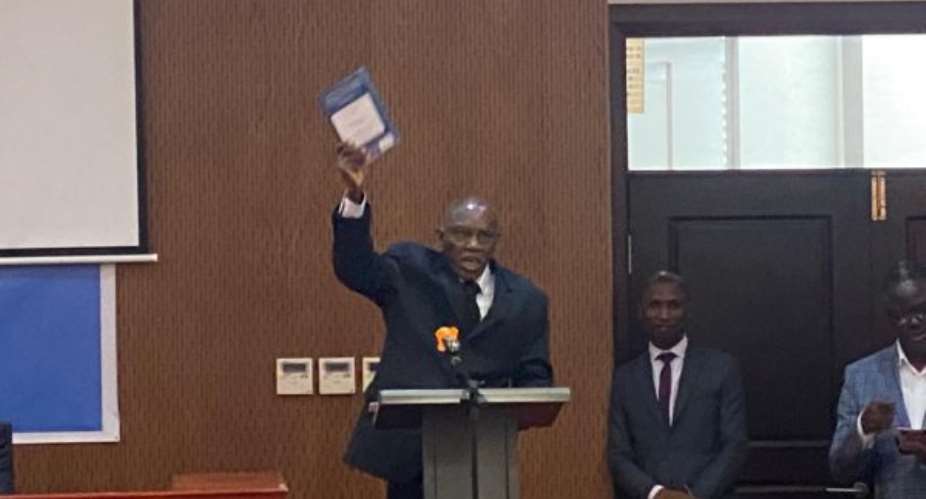Justice Jones Dotse, a Judge of the Supreme Court, has described Justice Alexander Osei Tutu's book: "Essential Themes in Land Law and Customary Law" as “a living and authoritative scholarly work.
Justice Dotse in the foreword of the book said the book was a 'well-researched book, a landmark book, 'an outstanding book,' a book masterfully and 'skillfully written.'
The book was launched in Accra by a Retired Supreme Court Judge Justice William Atuguba.
He, therefore, recommended it as "a truly indispensable book to judges, active legal practitioners, academicians and students."
The book speaks at length about the various provisions of Act 1036 and their application by the Courts.
The New Land Act (Act 1036) passed in 2020 December is touted as an innovation from the old.
The implementation of the progressive features of the Act is expected to enhance the administrative framework of land registration, security, and governance in Ghana.
The key features hold that chiefs, tendanas, clan heads, family heads or any authority/custodian in charge of the management of stool or skin, clan or family lands are accountable as fiduciaries, and hence, are subject to disciplinary sanctions if they fail to comply with such duties.
The Act also requires custodians of lands to establish a Customary Land Secretariat for the management of their respective lands.
Parties in land disputes are required to exhaust all procedures under the Alternative Dispute Resolution Act, 2010 (Act 798) before any action involving land can commence in Court.
Justice Osei Tutu, who is a Justice of the High Court in Ghana, and the Gambia captured the complexities around the role of the tendana in modern Ghana, an area not recognized under Act 1036.
The author said one provision which delights him was section 12 on land guards.
He said apart from it being made illegal, the legislature had provided for a fast-track approach to restrain persons who interfere with one's development of his or her land.
Additionally, he pointed out that section 13 of the New Land Act bears similar wording to Article 36 (8) of the 1992 Constitution and explained how the Act ultimately seeks to satisfy the provisions of the Constitution.
He said the book was unarguably the first audacious attempt by any writer since the coming into force of Act 1036 with a fine-tooth comb which discussed the new land law with a microscopic eye on the sections of the Act.
He said the approach of the book was in a form of well-researched articles that intentionally tease out the forward-looking attempt to reform the law.
The Author said with that door now opened to land users, it was expected that lawyers would take full advantage of the law with the cooperation of Judges to ensure that the era of harassment by unscrupulous persons, who loiter around demanding digging fees from land developers in Accra and other parts of the country would come to an end.
He said the book also has re-conceptualized other land law principles and practices that were long established in the past, such as, how a stool or a family litigates in court, the role of Statutory Declarations in land adjudication, subleasing or subletting without the lessor or landlord's consent, forfeiture, and re-entry.
Mr William Atuguba, a Retired Supreme Court Judge, said land was one of the technical areas of the law.
“I am happy the author has taken the lead to discuss the subject matter of land use in the country,” he said.
He said Justice Osei Tutu talked about certain principles in the Act which could be unconstitutional, adding that the “book is thoroughly written.”
The Retired Judge called on judges, law practitioners and law students to equip themselves with the book to know more about issues concerning the new land Act.
GNA





 We’ll protect state wealth from opaque deals – Prof Jane Naana
We’ll protect state wealth from opaque deals – Prof Jane Naana
 Mauritania president says running for second term in June polls
Mauritania president says running for second term in June polls
 I won't ever say I was a mere driver’s mate' — Prof. Opoku-Agyemang
I won't ever say I was a mere driver’s mate' — Prof. Opoku-Agyemang
 2024 polls: 'EC struggling to defend credibility'— Prof. Opoku-Agyemang
2024 polls: 'EC struggling to defend credibility'— Prof. Opoku-Agyemang
 Akufo-Addo gov't's 'greed, unbridled arrogance, unrestrained impunity, sheer dis...
Akufo-Addo gov't's 'greed, unbridled arrogance, unrestrained impunity, sheer dis...
 Election 2024: Ghana needs an urgent reset, a leadership that is inspiring – Ma...
Election 2024: Ghana needs an urgent reset, a leadership that is inspiring – Ma...
 Partner NDC to rollout a future of limitless prospects – Prof Jane Naana Opoku-A...
Partner NDC to rollout a future of limitless prospects – Prof Jane Naana Opoku-A...
 NPP will remain in gov’t till Jesus comes — Diana Asamoah
NPP will remain in gov’t till Jesus comes — Diana Asamoah
 Sunyani Technical University demands apology from former SRC president over sex-...
Sunyani Technical University demands apology from former SRC president over sex-...
 'Dumsor' was resolved by Mahama but ‘incompetent' Akufo-Addo has destroyed the g...
'Dumsor' was resolved by Mahama but ‘incompetent' Akufo-Addo has destroyed the g...
